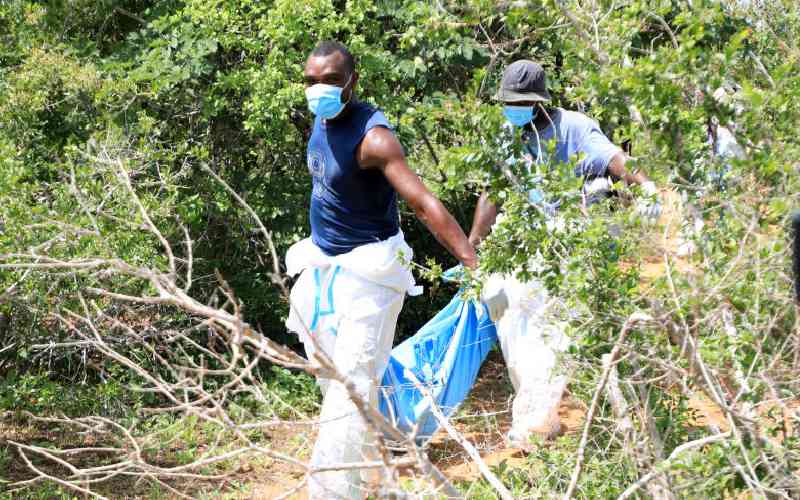By Eric Wainana
Kenya: When Zachariah Miringu decided to sell his three pigs in 2010, he wanted to opt out of an activity he felt he could no longer handle as he was too busy with his design job in Nairobi.
Little did he know that the move would be a turning point.
Mr Miringu recalls that by the time he was giving up on pig farming, his animals’ health had deteriorated as he hardly found time to travel to his rural home and look after them. At that time, he was rearing the animals in his grandmother’s farm in Mang’u, Kiambu.
“I was very frustrated. I took the pigs’ photos and posted them on Facebook, ready to sell them. After some time, a lady in the UK expressed interest and bought the three sows I had at Sh25,000 each, and said she would jet in to pick them and take them to her farm in Kenya,” Miringu says.
However, after completing the transaction, the buyer realised she would take longer than expected to get the animals, so she asked Miringu to take care of them until she made the trip.
She offered to pay him Sh3,000 a month per animal.
“I kept them for some months and realised I was making money even though I did not actually own the pigs. The money was enough to cater for the animals’ feed and still leave me with some extra cash,” he says.
After a few months, he contacted his friend who lived in Sweden and pitched the idea of him buying pigs and Miringu rearing them on his behalf for a fee. His friend agreed and bought two pigs, with an upkeep fee of Sh3,000 a month for each.
He branded the business Diaspora Pig Farming, given both his clients lived outside the country, and began to market it, mostly on social media.
The idea
The idea got quite a following, and he got several more clients, both local and international. So he decided it was time to quit his job.
With the increasing number of pigs he was dealing with, he moved out of his grandmother’s homestead and purchased land in Juja Farm, which is 15km from Juja town.
Today, Miringu has 42 clients and 330 pigs on a half acre, and renamed his business Wess Pig Farm.
“Many people would visit my farm and feel they were in the wrong place because the name ‘Diaspora’ implied that I only dealt with people who live outside the country,” he says.
Stay informed. Subscribe to our newsletter
“It also wasn’t proper for clients to visit my granny’s compound to see their pigs, but here, they can visit any time and see their animals. It’s just like their farm, only that it is communal.”
Miringu has separate paddocks for each of his clients’ pigs.
Besides rearing pigs, he also runs a pork butchery and supplies the meat to other dealers, which makes it easier for his clients to find a market.
To join his farm, one has to buy at least two pregnant sows from him, each at Sh25,000. This ensures his existing clients find customers for their animals.
For each pig, the monthly cost is Sh4,000 until two months after delivery — which is when the piglets stop feeding from the sow.
After this, a client pays Sh10,000 per month, irrespective of the number of piglets born. .
“We only sell pregnant pigs to make sure new clients start earning money soon. Normally, pigs are mature for meat at six months.”
So this is how the investment works.
If you buy two pigs that are two months from delivery, and each pig delivers 10 piglets, you will end up paying Wess Pig Farm Sh163,000 over six months.
That is, Sh1,000 for the agreement, Sh50,000 for the two sows, then Sh32,000 in upkeep for the sows for four months — two months before delivery and two months after — and finally Sh20,000 a month for four months for the 22 pigs you now own.
According to Miringu, a six-month-old pig weighs at least 55 kilos, with a kilo of pork now selling at Sh200 wholesale.
So if you were to sell the 20 piglets you have for meat, you stand to make at least Sh220,000.
And by this time, the sow is ready for mating — you can get a two cycles of piglets in a year.
Miringu says his business is mostly trust-based as most of his clients do not have the time to visit the farm, and instead send him the money to purchase the sows, believing he will make the right choice.
His biggest challenge, other than the high cost of animal feed, is when disease strikes.
“In August last year, a disease wiped out 32 pigs and it was impractical to tell the clients to carry the cross since the death of animals is not addressed in the agreement. So I had to replace the pigs at my own cost,” he says.
Going forward, however, he said he is in negotiations with insurance companies to discuss a cover for the pigs he rears starting this year to ensure he is compensated in case of any losses.
He has also started an animal feeds factory in Thika — Wess Feeds — to lower his operating costs.
His advice to other entrepreneurs?
“Be job creators, not job seekers. And do not be choosy about the income-generating activity you take up.”
[email protected]
 The Standard Group Plc is a
multi-media organization with investments in media platforms spanning newspaper
print operations, television, radio broadcasting, digital and online services. The
Standard Group is recognized as a leading multi-media house in Kenya with a key
influence in matters of national and international interest.
The Standard Group Plc is a
multi-media organization with investments in media platforms spanning newspaper
print operations, television, radio broadcasting, digital and online services. The
Standard Group is recognized as a leading multi-media house in Kenya with a key
influence in matters of national and international interest.
 The Standard Group Plc is a
multi-media organization with investments in media platforms spanning newspaper
print operations, television, radio broadcasting, digital and online services. The
Standard Group is recognized as a leading multi-media house in Kenya with a key
influence in matters of national and international interest.
The Standard Group Plc is a
multi-media organization with investments in media platforms spanning newspaper
print operations, television, radio broadcasting, digital and online services. The
Standard Group is recognized as a leading multi-media house in Kenya with a key
influence in matters of national and international interest.






